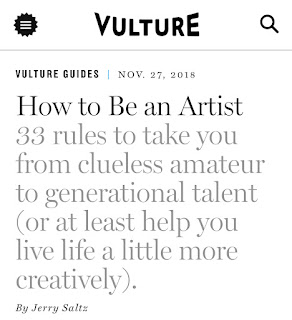Concepción de León posted on the New York Times "Does It Pay [Well] to Be a Writer?" (Jan. 5, 2019). In the piece, de León wrote that in 2017 the median income for full-time writers was $20,300 and for part-time writers it was $6,080:
Writing has never been a lucrative career choice, but a recent study by the Authors Guild, a professional organization for book writers, shows that it may not even be a livable one anymore.
According to the survey results, the median pay for full-time writers was $20,300 in 2017, and that number decreased to $6,080 when part-time writers were considered. The latter figure reflects a 42 percent drop since 2009, when the median was $10,500. These findings are the result of an expansive 2018 study of more than 5,000 published book authors, across genres and including both traditional and self-published writers.
And de León shared that, unlike in the 1900s, today's writers need to supplement their incomes (e.g., teaching):
“In the 20th century, a good literary writer could earn a middle-class living just writing,” said Mary Rasenberger, executive director of the Authors Guild, citing William Faulkner, Ernest Hemingway and John Cheever. Now, most writers need to supplement their income with speaking engagements or teaching. Strictly book-related income — which is to say royalties and advances — are also down, almost 30 percent for full-time writers since 2009.
de León attributed the decline in writer's pay to a decline in freelance journalism and "Amazon’s lion’s share of the self-publishing, e-book and resale market":
Writing for magazines and newspapers was once a solid source of additional income for professional writers, but the decline in freelance journalism and pay has meant less opportunity for authors to write for pay. Many print publications, which offered the highest rate, have been shuttered altogether.
The decline in earnings is also largely because of Amazon’s lion’s share of the self-publishing, e-book and resale market, Ms. Rasenberger said. The conglomerate charges commission and marketing fees to publishers that Ms. Rasenberger said essentially prevent their books from being buried on the site. Small and independent publishers, which have fewer resources and bargaining power, have been particularly hard hit. Book publishing companies are passing these losses along to writers in the form of lower royalties and advances, and authors also lose out on income from books resold on the platform.
de León reminded me of Jerry Saltz's New York article "How to be an Artist [e.g., Writer]" where Saltz wrote that an artist slash writer should not feel bad about the likelihood of being poor, because one should not write to be rich:
Lesson 20: Accept That You Will Likely Be Poor
Even though all we see of the art world these days are astronomical prices, glitz, glamour, and junkie-like behavior, remember that only one percent of one percent of one percent of all artists become rich off their artwork. You may feel overlooked, underrecognized, and underpaid. Too bad. Stop feeling sorry for yourself; that’s not why you’re doing this.


No comments:
Post a Comment